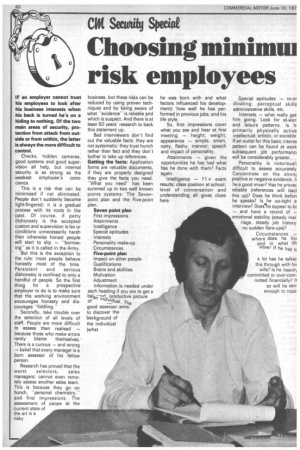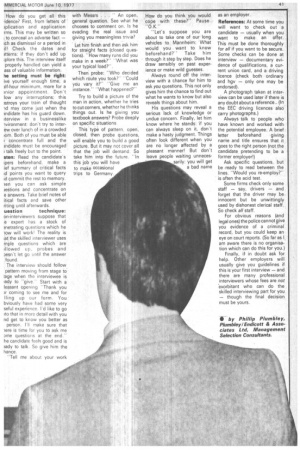Secuttity Special
Page 42

Page 43

If you've noticed an error in this article please click here to report it so we can fix it.
Choosing mininnu risk employees
IF an employer cannot trust his employees to look after his business interests when his back is turned he's on a hiding to nothing. Of the two main areas of security, protection from attack from outside or from within, the latter is always the more difficult to control.
Checks, hidden cameras, good systems and good supervision all help, but internal security is as strong as the
Weakest employee's conscience.
This is a risk that can be minimised if not eliminated. People don't suddenly become light-fingered; it is a gradual process with its roots in the -past. Of course, if petty dishonesty is the accepted custom and supervision is lax or conditions unnecessarily harsh then otherwise honest people
will start to slip — borrowing" as it is called in the Army.
But this is the exception to the rule: most people behave honestly most of the time.
Persistent and serious dishonesty is confined to only a handful of people. So the first thing for a prospective employer to do is to make sure that the working environment encourages honesty and discourages "fiddling."
Secondly, take trouble over the selection of all levels of staff. People are more difficult to assess than realised — because those who make errors rarely blame themselves. There is a curious — and wrong — belief that every manager is a born assessor of his fellow person.
Research has proved that the worst selectors, sales managers; cannot even remotely assess another sales team. This is because they go on hunch, "personal chemistry," and first impressions. The assessment of peope at the current state of the art is a risky business, but these risks can be reduced by using proven techniques and by being aware of what "evidence" is reliable and which is suspect. And there is at least 50 years" research to back this statement up.
Bad interviewers don't find out the valuable facts: they are not systematic: they trust hunch rather than fact and they don't bother to take up references. Getting the facts: Application forms are valuable documents, if they are properly designed they give the facts you need. "What you needhas been summed up in two well known points systems: The Sevenpoint plan and the Five-point plan.
Seven point plan First impressions Attainments Intelligence Special aptitudes Interests Personality make-up Circumstances Five-point plan Impact on other people Qualifications Brains and abilities Motivation Adjustment of
balan—P.-1 . productive picture Infoinrmdavtii_dounalis. The neededunder each heading if you are to get a
din good assessor aims to discover the background of the individual' (what he was born with and what factors influenced his development): how well he has performed in previous jobs; and his life style.
So, first impressions cover what you see and hear at first meeting — height; weight; appearance — simple, smart, natty, flashy, manner; speech and impact of personality.
Attainments — given the opportunities he has had what has he done with them? Facts again.
Intelligence — 11+ exam results; class position at school; level of conversation and understanding all gives clues here. Special aptitudes — co-or dinating; perceptual skills administrative skills, etc.
Interests — what really get: him going. Look for at-wonl and leisure patterns. Is hi primarily physically active intellectual; artistic; or sociable' If an outlet for this basic interes pattern can be found at work subsequent job performanc( will be considerably greater.
Personality is notoriousl) difficult to assess accurately Concentrate on the stronc positive or negative evidence. h he a good mixer? Has he prover reliable (references will bad this up)? Does he think befor( he speaks? Is he up-tight a interview? Does.Fie appear to IN — and have a record of — emotional stability (steady mar riage, steady job history no sudden flare-ups)?
Circumstances -where does he livE and in what lift style? If he has tc a lot has he talker this through with hit wife? Is he heavil committed or over-committed financially? 11 so will he earr enough to cope How do you get all this idence? First, from letters of )plication and application rms. This may be written so to conceal an adverse fact — ich as dismissal or a period in il! Check the dates and Itterns: if they don't add up ;plore this. The interview itself properly handled can yield a ass of valuable information. lie setting must be right: ive yourself enough time, a )If-hour minimum, more for a :nior appointment. Don't low any interruptions; this stroys your train of thought id may come just when the indidate has his guard down. iterview in a businesslike wironment: don't try to interew over lunch of in a crowded iom. Both of you must be able I concentrate full and the )ndidate must be encouraged talk freely but to the point. sten: Read the candidate's ipers beforehand, make a ief summary of critical facts id points you want to query id commit the rest to memory. Ien you can ask simple iestions and concentrate on e answers. Take brief notes of itical facts and save other riting until afterwards.
uestion technique: on-interviewers suppose that ie expert has a stock of )netrating questions which he )ow will wok l The reality is at the skilled interviewer uses mple questions which are Mowed up, probes and Desn't let go until the answer found
The interview should follow. pattern moving from stage to age when the interviewee is ady to "give,Start with a leasant opening "Thank you )r coming to see me and for lling up our form. You bviously have had some very seful experience. I'd like to go Ito that in more detail with you nd get to know you better as person. I'll make sure that lere is time for you to ask me Dme questions at the end.' he candidate feels good and is ?ady to talk. So give him the hance.
"Tell me about your work with Messrs . . . " An open, general question. See what he chooses to comment on. Is he evading the real issue and giving you meaningless trivia?
Let him finish and then ask him for straight facts (closed questions). "How many runs did you make in a week?" "What was your typical load?".
Then probe: —Who decided which route you took?" "Could you vary it?" "Give me an instance." -What happened?"
Try to build a picture of the man in action, whether he tries to cut corners, whether he thinks things out. Is he giving you textbook answers? Probe deeply on specific situations.
This type of pattern, open, closed, then probe questions, will enable you to build a good picture. But it may not cover all that the job will demand. So take him into the future. "In this job you will have to make occasional trips to Germany. How do you think you would cope with these?" Pause.
"Let's suppose you are about to take one of our long vehicles to Mannheim: What would you want to know beforehand?" Take him through it step by step. Does he draw sensibly on past experience or make wild guesses.
Always round off the interview with a chance for him to ask you questions. This not only gives him the chance to find out what he wants to know but also reveals things about him.
His questions may reveal a serious lack of knowledge or undue concern. Finally, let him know where he stands: if you can always sleep on it, don't make a hasty judgment. Things often look different when you are no longer affected by a pleasant manner! But don't leave people waiting unnecessarily: you will get a bad name as an employer.
References: At some time you will want to check out a candidate — usually when you want to make an offer. This must be done thoroughly for all if you want to be secure. Some checks can be done at interview — documentary evidence of qualifications, a current union card, and a driving licence (check both ordinary and hgv — only one may be endorsed).
A photograph taken at interview can be used later if there is any doubt about a reference.. (In the EEC driving licences also carry photographs.) Always talk to people who have known and worked with the potential employee. A brief letter beforehand giving name and title ensures that it goes to the right person (not the candidate, pretending to be a former employer!) Ask specific questions, but be • ready to read between the lines. "Would you re-employ?" is often the acid test.
Some firms check only some staff — say, drivers — and forget that the driver may be. innocent but be unwittingly used by dishonest clerical staff. So check all staff.
For obvious reasons (and legal ones) the police cannot give you evidence of a criminal record, but you could keep an eye on court reports. (So far as I am aware there is no organisation which can do this for you.) Finally, if in doubt ask for help. Other employers will usually give you guidelines if this is your first interview — and there are many professional interviewers whose fees are not 'exorbitant who can do the skilled interviewing part for you — though the final decision must be yours.




























































































